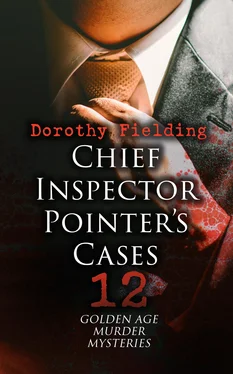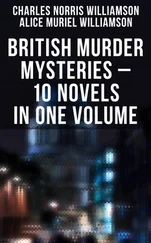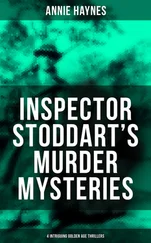"They look excellently taken. How soon can you pour in the plaster?" the Assistant Commissioner asked. "This ought to help forward the case."
"It will settle it, sir," Pointer said quietly.
The Chief Commissioner affected surprise. As for the men, who were just preparing to leave, they started as though each had been shot.
"Yes, sir," Pointer repeated, "this will end the case."
"Suppose you tell us just how we stand at present," suggested the Commissioner. "Let's all sit down again and hear it."
Every one sat.
Watts, too, took a seat, after putting the plates on one side. He chose a chair in the centre of the doorway, and quietly locked the door. He had a civilian assistant this time, who bore the not uncommon name of O'Connor.
"The details'll come out later, sir," Pointer began, "but as we are at present, this is how the case runs. Miss Charteris had an engagement that Thursday evening with Mr. Bellairs in his studio. He was painting her portrait. Count di Monti had learnt of her visits, and arrived on the scene. Miss Charteris had been fetched by a friend, but the count and Mr. Bellairs quarrelled over her."
Both men looked as though they would like to break in, but Pointer's impassive, eye held them, while he passed on.
"The count, as an additional proof of her presence, took away a letter that Miss Charteris had left behind her by accident. It was the enclosure that her father had sent her in her letter of the afternoon. When Count di Monti learnt of the 'accident', as it was called, to her, he at once handed this letter to a friend's brother who was starting that same Friday morning for Italy. It was posted back from Milan to the professor's club. Miss Charteris missed it at once when she returned to her room, and went to the top of the summer house to speak to you about it, Mr. Bellairs. She had asked you to meet her there as soon as you could come. Evidently ten was the hour one or other of you set. I take it she had asked you to let her know how things had gone between you and Count di Monti. She was sure you would quarrel. You decided not to go."
A chuckle came from di Monti.
"I decided for him."
"Had you gone," Pointer still spoke to the artist, "you might have postponed, but you would not have changed the end. The murderer caught sight of her standing alone under the light of the electric lantern up above. He thought that she was there to hand on the enclosure. He switched off the light, ran up the stairs, possibly made some comment about the lamp being out of order, and then as she leant back, perhaps to look at it, an arm was thrust under her knees, and she was flung full force backwards on to the flags below, breaking her neck as she struck them, and cutting her head on a flower pot."
There was one collective gasp from the room.
"As far as we know, she didn't even cry out. Had she done so, and had it been heard, he would have been the first to shout for help, we may be sure, and rush down to see if anything could be done for her. But he would have taken her silver chain bag just the same. Either from the top, where she had dropped it, or from beside her—"
"The bag?" Scarlett said in a dazed voice
"The bag which had held the enclosed letter. Miss Charteris was murdered for the sake of something which, her father was believed, quite erroneously, to have sent her. And now I am sorry to say I have to tell you about another death. Professor Charteris was murdered, too. He was killed in Northern Italy, for the same reason that cost his daughter her life By sheer accident he was present when a so-called Bulgarian traveller was killed. But the man was not a Bulgarian. He was Neumann, the great secret leader of the Soviet spy system. On him was a paper in cipher giving the names of all the chief Bolshevik agents in Europe. As a matter of fact, the professor never saw that paper, or knew of its existence. But the men with Neumann knew that he had helped their friend into the hospital, saw him reading a similar slip of paper on the hospital steps, followed him, and killed him in a lonely valley, where they could rifle his pockets. In his letter-case they found the receipt for a registered letter sent off immediately after his visit to the hospital."
So still was the room that the ticking of the watch which each man wore could be heard.
"But to go back to Miss Charteris's murderer. He had received news that a paper had been sent her which must at all costs be intercepted, and at once. If she had read it, she, too, was to be killed. The professor, being one of the finest cipher readers in the world, might very likely have written her the real names which were hidden in that apparent Russian poem. I think the murderer asked her about that letter before he flung her over. Miss Charteris, very much upset by the evening's events, as we know from her maid, forgot, I think, that she had taken it out, and spoke of it as still there. In any case, he jumped to the conclusion that it was there, and that she had read it. Now, he has the bag, the girl is dead, but he has no letter. He feels sure, however, from what she had said, that nothing had been done with it. It will be in her room, and he must get it later. He notices, for the first time, that when he stooped far over the rail to watch her fall, he smeared green paint on the inside of each hand. Not enough to show when close, perhaps, but enough to have some very awkward questions asked, should her body be discovered at once, as it may be. When we saw the smudges left by the two hand-grips on that painted rail," Pointer identified himself with Harris and Rodman by a glance, "we realised that the murderer must have had some way of getting the marks off. Water wouldn't touch them, nor would mere wiping do. He could neither take the time to thoroughly clean his hands then, nor chance its not being noticed. He had to return immediately and go on with the game, or risk comment. Yes," in answer to the distended eyes fixed on him, "the murder was committed by 'dummy' in the few minutes during which a hand was being played at bridge that Thursday evening. That was why that shot was trumped up, and a false alarm given—"
And then the Assistant Commissioner jumped. He stumbled over some one's legs, the table was between him and his object, but he grappled fiercely for a second. But with a laugh which was like a neigh, Cockburn got the hand with the ring he wore to his mouth, and bit off the small black pearl. It cracked like a glass phial between his teeth.
"Too late, Pelham, and there's no power on earth can stop or alter the stuff I've taken. Surely you never thought you could hang me!"
The Assistant Commissioner took it hard. His face worked silently. As for Pointer, he had sprung to his feet, too, with Harris and Rodman. The Chief Inspector rapped out an oath as the apparent pearl crunched, and that was something no one there had ever heard him do before. Now he sat down with the bitter look of a man who sees the best part of what he has worked for torn from him.
He made a visible effort to be calm, however, and turned to Cockburn.
"I must caution you that anything—"
Cockburn rocked in ghastly merriment. "My good fellow, you don't understand. What do you suppose I had in this little pearl of mine? This mourning ring I've taken to wearing lately? Something for a headache? In an hour from now, to the minute, I shall fall asleep, and nothing you can do or try to do, will prevent me from drifting painlessly into oblivion. That being so, I'm quite ready to oblige with any information—"
"I caution you that it may be used against you."
"You do, oh most excellent policeman!" mocked Cockburn.
Suddenly Bond came to life. With a slack jaw and a whitening face he had been staring as if numbed by what had happened.
"Those Polish papers," he suddenly turned on the man beside him, "I ought to've guessed when I caught you with them! Give me his keys somebody; I wouldn't touch him with a barge-pole, and his confederates may have them already in their hands."
Читать дальше












